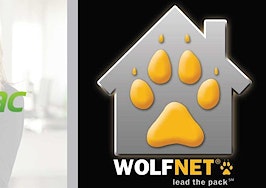There’s a well-known saying on the Internet: “If you’re not paying for the product, you are the product.” Sites such as Google, Facebook and Amazon routinely track users both for their own use and for third-party advertising. Zillow and realtor.com do as well.
Now, the websites of potentially hundreds of thousands of agents are either already doing or about to do the same thing — but largely without agents’ knowledge or consent or that of their broker. And there’s no guarantee that agents or brokers will see a cent of the proceeds.
Real estate startup ListTrac has gained traction as a free MLS tool that tracks listing performance. But unbeknownst to most agents and consumers, it also harvests behavior data that the company plans to sell to third-party advertisers.
And should ListTrac make money — it hasn’t yet — the multiple listing services that have inked deals with the startup stand to get a cut of the revenue.
So far, about 30 MLSs representing about 425,000 agents and brokers and over half a million listings have signed up for ListTrac, a service of parent company Vendigi.
Since its official debut last year, ListTrac has billed itself as a free tool that tracks leads and views from online real estate listings to help agents and brokers figure out which sites offer more bang for their buck.
At MLSs’ behest, ListTrac’s monitoring code has been installed on agent and broker IDX websites, internal MLS client portals, and/or MLS public-facing websites, depending on the MLS.
Zillow Group pushes analytics about listing performance to ListTrac, but the portal giant has so far refused to install ListTrac’s monitoring code on its websites.
MLSs have had the code installed on an automatic opt-in basis — and due to the templated nature of most IDX websites, agents and brokers generally cannot opt out.
What is being traded in exchange for the free tool? In interviews with Inman, ListTrac had consistently declined to discuss its revenue model. The company now says this was due to competitive reasons and because the viability of the model was (and is) still being explored.
But last month, a Boston-based Internet data exchange (IDX) website provider, www.realestate Inc., contacted Inman, saying www.realestate Inc. had refused to implement ListTrac’s monitoring code in its websites for agents belonging to ListTrac customer Cape Cod and Islands MLS.
“Our business code of conduct prevents us from installing any third-party software we feel would harm you or others,” wrote the company’s founder, Mark Holt, in an email to its CCIMLS customers.
“We will not install monitoring software at the direction of any third-party without consent. We consider ListTrac’s ‘monitoring code’ dangerous at this time, therefore we will not install it.”
ListTrac’s monitoring code is an “unknown back-door Trojan” that’s installed without agents’ express permission on their websites at the behest of their MLSs, Holt told Inman.
Executives for ListTrac parent company Vendigi [pronounced “Ven-dee-jee”] disputed many of Holt’s claims, saying he misrepresented the company’s business model.
Vendigi CEO Trent Gardner told Inman that its ListTrac customers — MLSs and their boards of directors — knew about its intended business model, as did brokers that the company has presented to, including those belonging to The Realty Alliance and other organizations.
“Nothing is being hidden. Have we come out and publicized it? No, we have not,” but MLSs and many brokers knew, Gardner said. The tracking is also described in ListTrac’s privacy policy.
Holt said that agents and brokers he spoke with were unaware of ListTrac’s revenue model.
“I got a lot of feedback that people had no idea, that they hadn’t been informed, that they hadn’t consented and so they didn’t want those [tracking] agents installed on their websites. They universally opted not to. It was a big surprise to them,” he said.
“They had concerns about their trade secrets and their website users’ privacy,” he added.
Holt said www.realestate Inc. had not been indemnified by ListTrac, CCIMLS or its customers for any claims arising out of installing ListTrac.
“We do not want to be the agent of an unfair trade practice where we are complicit in stealing the user activities of Internet real estate website users without their explicit agreement,” Holt said.
Potential investors in the company knew about Vendigi’s data-tracking initiative. Until last month, Vendigi’s profile on investor site EquityNet.com touted its “exclusive” relationships with multiple listing services and spelled out the company’s business model. The profile has since been scrubbed of nearly all of its information, but here is an excerpt of what the profile used to say:
“Vendigi provides a complimentary platform to the MLS for real estate brokers to monitor consumer engagement with their listing content. The platform demonstrates the marketing value of the MLS to their customer, the real estate broker. In return, Vendigi [is] granted exclusive access to harvest and monetize broker, buyer and seller audience data.
“Once harvested, advertisers (The Home Depot, Wells Fargo, Time Warner Cable, etc.) that offer services around home purchase/ownership pay for Vendigi’s digital audience data. The audience data when used in online campaigns allow advertisers to put their ads in front of the right person (home buyer, seller or owner) at the right time (financing a home, buying a home, selling a home, just moved into a home, remodeling a home, refinancing a home, large equity in a home, etc.).
“Vendigi is the first to harvests broker and agent digital audiences from their source system, the MLS. This allows advertisers (Zillow, Trulia, Realtor.com, etc.) with products and services aimed at real estate professionals the ability to target these audiences as never before. Advertisers pay Vendigi for this audience.”
To be clear: ListTrac has yet to sell any data — it is currently in its “harvesting” phase as it bulks up its MLS client base, according to Gardner. He estimated the company may be ready to start selling in three to six months.
MLSs Inman spoke to confirmed that the company had yet to bring in any revenue.
Check out Vendigi’s pitch to investors:
The company is currently running on angel investments. Vendigi chief technology officer Ata Hassan declined to disclose how much the company had raised, but said it was more than the $200,000 listed on the EquityNet site.
ListTrac has met with MLS tech committees, syndication task forces and MLS boards — all made up of agents and brokers — to ensure no personal information would be shared and that no MLS listing content would be licensed or sold, the company said.
“I’m not quite sure what’s dangerous,” Hassan told Inman, referring to Holt’s email.
“If dropping a cookie is dangerous, then maybe the whole Internet is dangerous and maybe [Holt] shouldn’t go on it.”

So far, only steps 1-3 in this diagram have taken place; ListTrac has not yet sold the collected data.
The “cookie” Hassan referred to is a small piece of data stored in a user’s Web browser to uniquely identify the browser and track user behavior. On sites that have installed ListTrac’s monitoring code, that code reaches out to ListTrac’s servers and tells it about an event that happened — i.e. a listing was viewed, a lead form sent, a property favorited or shared.
At that point, ListTrac tags the browser with a cookie unless the browser has been set to reject cookies. As the consumer interacts with the site, ListTrac continues to gather metrics about the consumer’s behavior: Did the consumer look at photos or a virtual tour? What are the characteristics of the listings the consumer viewed?
Nearly all websites — including Inman.com — use cookies to recognize and track users.
“This is how the Internet works,” Hassan said.
Once ListTrac has gained enough geographic coverage and explored the viability of its model, it will combine consumer behavior with listing attributes to create pooled advertising segments, or “audiences,” to offer up to advertisers.
The audiences Vendigi initially plans to sell include potential homebuyers, but selling potential seller, agent and broker audiences is on also on the company’s roadmap.
No actual data is exchanged, Hassan said. Advertisers simply choose an audience they’d like to target, such as “potential homebuyers that searched for homes on or near a golf course,” similar to setting up a Facebook ad campaign.
ListTrac doesn’t share confidential information, such as names, addresses or locations, Hassan said.
Vendigi plans to sell audiences to ancillary companies that offer home improvement, home security, telecom and other services.
“We will not sell this information to other brokers or agents. Obviously, that would shoot ourselves in the foot,” Gardner said.
Through real-time bidding, different advertisers will have a split second to bid on what ad they want to display to consumers based on prior behavior. For instance, homebuyers seeking for properties near golf courses might start seeing ads for discounts on Golfsmith golf equipment follow them around the Internet.
This type of technology is called programmatic advertising or programmatic buying. Programmatic allows marketers to cherry-pick the consumers who will see their ads, according to a recent white paper.
“Using data tied to consumer segments and web behavior, advertisers can select each impression they wish to buy for a campaign,” the paper said.
“This puts an end to the ineffective practice of blasting the same message to everyone in the room, whether they’re likely to purchase what’s being advertised or not.”
According to ListTrac, this type of technology is a win-win for brokers and consumers. Consumers see advertisements that are relevant to them in real-time, and brokers get a way to potentially monetize their data.
ListTrac presented by Vendigi from ListTrac on Vimeo.
ListTrac’s agreements with MLSs generally require the company to offer MLSs a revenue share after ListTrac begins to take in revenue above a certain threshold. ListTrac expects that MLSs will pass that revenue onto their brokers.
“For years, companies have taken listing content and assembled multi-billion dollar business models by monetizing the ‘eye-balls’ looking at this valuable content,” Gardner said in a statement.
“However, these business models don’t allow brokers to participate — so they have been sidelined watching others make millions of dollars in IPOs [initial public offerings] off of their content. ListTrac helps change that paradigm with a framework allowing real estate professionals to monitor and monetize their listing content.”
Vendigi has intended to remunerate brokers for their listing content from its inception. The company was granted a patent for its tracking process in 2013 that incorporates its planned compensation model for content providers.
But since the company’s deals are with MLSs and not brokers themselves, whether brokers — let alone the agents that do the leg work to get the listings – will actually see any money is an open question. The MLSs Inman spoke to were more likely to say they would pass the revenue on in the form of better MLS services rather than cut brokers a check.
For more on what MLSs have to say about ListTrac’s business model, see Part 2: “MLSs defend ListTrac data deals.”
Inman Connect San Francisco is right around the corner — register now and save $200!







